Farming in Carnone, Co Donegal, is up and coming Blue Texel breeder Jessica Wilson.
She farms with her brother James and sister Julie. Farming runs deep in the Wilson family’s DNA, driving these highly-dedicated young farmers to continue building a sustainable and successful farming business for themselves and future generations.
The family farm enterprises include finishing cattle, finishing store lambs and lambing down a flock of pedigree and commercial ewes.
Blue Texels: the right choice
With a dream of keeping her mother’s passion for sheep alive, Jessica decided to establish her own pedigree Blue Texel flock. Jessica did a lot of research before starting her pedigree flock and after a lot of consideration of many breeds, from Kerry Hills to Charollais and Border Leicesters, it was the Blue Texel’s unique characteristics that ultimately won over Jessica.
What drew her to the Blue Texels was their ease of lambing and efficient growth rates; these traits also aligned perfectly with the farm’s overall aims.

Store lambs on the Wilson farm.
In 2022, the first Blue Texel ewe lambs landed on the farm. These were a gift to Jessica from her sister for her 17th birthday. Shortly thereafter, Jessica went on to purchase another ewe lamb from a leading Northern Irish flock.
These grew into impressive ewes, getting the flock off to a great start. Jessica purchased several more in-lamb ewes the following year and the first crop of Farmview lambs was born in 2024.
The pedigree ewes lamb indoors in February, with most of the ewes being served via AI – as this gives Jessica a chance to use a number of different rams across her flock and also allows for a compact lambing season.
Once lambs are a few days old and weather-dependent, the ewes and lambs are put out to grass. Jessica said that “the Blue Texel lambs have proven to be very resilient on this system”.
Showing success
Showing for the first time in 2024, the Farmview flock enjoyed much success, picking up many placings across the country. This included a very successful day at Inishowen Agricultural show, where Jessica’s homebred ewe lamb Farmview Indigo picked up the overall champion spot and one of her foundation ewes picked up the overall reserve champion spot in the highly-contested Blue Texel section.
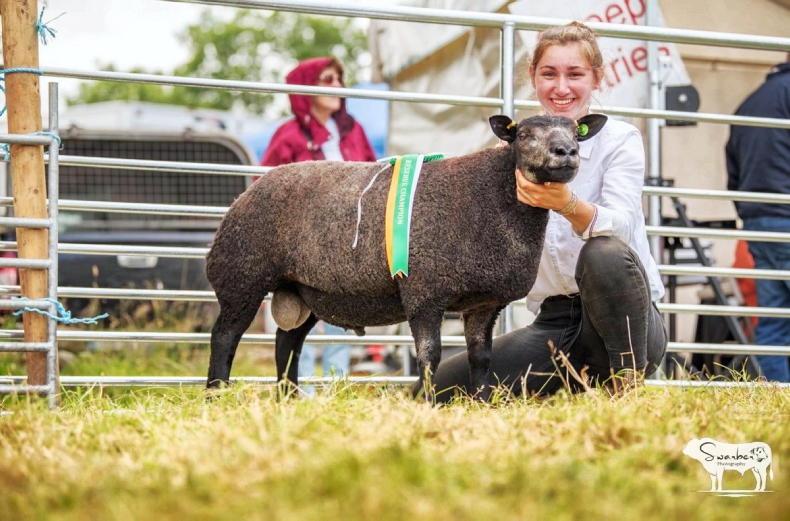
Jessica with her Blue Texel ram lamb that won reserve champion Blue Texel at Grange Show. \ Swarber Photography
The flock also picked up numerous placings, with a strong team of lambs at the 2024 Tullamore Show. Jessica’s flock continued picking up many championships and reserve champion spots at many other agricultural shows.
Sale season
The first ever sale the flock attended was the Irish Blue Texel Sheep Society’s premier sale, that was held in Carrick-on-Shannon in August 2024. It was an all-male consignment that Jessica put forward on the day.
Her leading ram lamb Farmview Ironboy went on to sell for €840, one of the top prices paid for a Blue Texel ram lamb on the day.
The first female to be sold from the flock was sold at the Coloured Christmas Cracker sale, that is held annually in Ballybofey and Stranorlar Livestock Mart.

Julie and Jessica at Inishowen Agricultural Show where they picked up champion and reserve champion Blue Texel.
With a strong belief in giving back to the community, the Wilson family decided to donate all the proceeds of this ewe lamb’s sale to the Irish Cancer Society. It went on to raise €600 for the heartfelt cause.
Education
Jessica is currently a second-year student, studying agriculture and technology at the CAFRE Greenmount campus. As part of the course, Jessica must do a 12-week work placement, which she is completing at Ulster Wool.
For her research scholarship, Jessica is researching various aspects of wool from farm to yarn. To collect data for her research, she has surveyed many farmers across Northern Ireland through online and paper surveys.
Commercial flock
Running alongside the pedigree flock, the Wilsons run just over 60 breeding ewes. The commercial flock is made up mostly of Suffolk and Texel-cross ewes. They are housed on straw and due to lamb in April. The Wilsons aim to lamb each year over the Easter holidays, as this allows Jessica and her sister Julie to manage lambing without missing out on college lectures.
The mature ewes are carefully selected at breeding and mated with Suffolk, Texel and Charollais rams.
All of the replacement ewe lambs are also mated in the first year on the farm, with the exception of the pedigree Blue Texel show lambs.

Jessica with a selection of her pedigree Blue Texel ewes and lambs that were born last month and are now thriving at grass.
The Wilsons have been using a Blue Texel ram on their ewe lambs over the past few years with great success. The Blue Texel-cross lambs allow easy lambing for these first-time mothers and they also finish easily off the grass-based system, with an excellent carcase grade.
The Wilsons’ system of using a Blue Texel ram on the ewe lambs has proven to be a huge benefit to the flock’s overall production over the last number of years, reducing barren rates within the flock and bringing their overall scanning percentage up to an impressive 220%.
Beef production
The main enterprise on the Wilson farm is beef production. Each year a large number of weanling bulls are bought in from marts across Donegal and the northwest. All of the bulls that are bought in are aged from nine to 12 months. They are also all U-grade bulls, that are sound and have a good conformation, to allow for efficient growth.
Once the bulls are on-farm, they are split into groups in accordance with age and weight – this allows the group to stay together until slaughter, avoiding any stress and potential injury that mixing bulls at a later stage can cause.
After splitting the bulls, they are put to summer grass – where they will graze for a number of months, allowing them to mature and grow naturally.
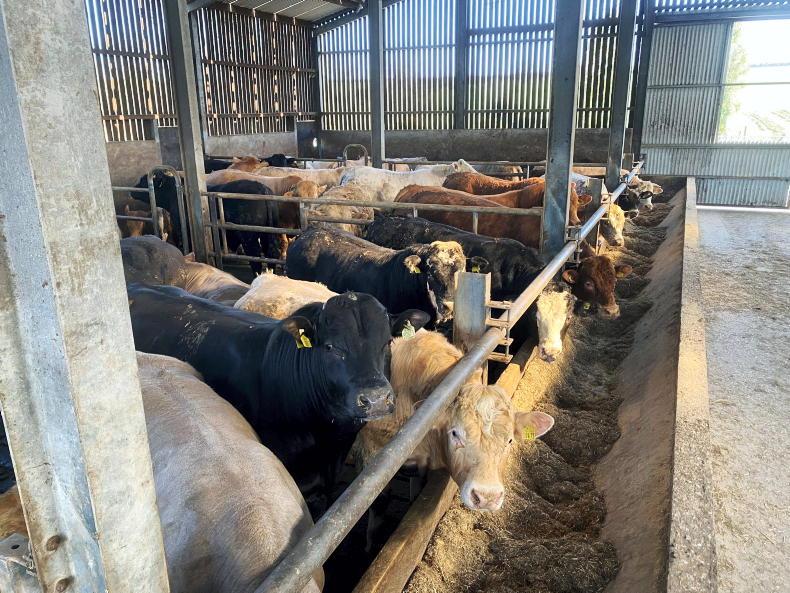
A selection of the Wilsons' beef bulls.
Grazing these bulls over the summer months helps to reduce the feed costs on the farm and improve the farm’s overall sustainability.
These bulls are then housed and introduced to a beef-finishing ration that is fed through a total mixed ration, containing a number of different forage sources to ensure rumen health and optimum growth. The bulls are then all finished before they reach 16 months of age, ensuring the production of high-quality beef.
The comfort of these bulls is also a large priority for the Wilsons. They have a mixture of slatted and straw-bedded sheds. The slats are topped with thick rubber matting, to ensure the ultimate comfort for the bulls, allowing them to gain weight as efficiently as possible in those crucial months of housing before slaughter.
Store lamb production
Lamb production is also a vital part of the family farm business, working hand in hand with the beef production system. Once the beef cattle begin to be housed, store lambs are bought in to eat the winter grass – to allow for fresh grass to grow back again in the spring, enabling the bulls to be turned out early to high quality spring grass.
The store lambs are also bought in marts across Donegal and the northwest. These are both a mixture of ewe lambs and ram lambs, but they are all bought in weighing over 35kg, with a good conformation, to enable the most efficient and effective growth.
Once the lambs are on-farm, they are also split into groups, using a similar method to that used on the bulls – the ewe lambs and ram lambs are split up and then grouped according to weights. These lambs are also all vaccinated and dosed to help prevent as many diseases as possible.
Depending on grass growth and sheep numbers, the Wilsons try to get as many lambs as possible finished on grass and any lambs that aren’t finished on grass, are then housed and finished on an ad-lib meal diet.
When housed the lambs are also clipped, preventing any build-up of wool in the slats and prevents them from getting too warm, allowing for healthier, more content lambs.
When housed and at grass, the store lambs are weighed weekly and drafted for slaughter to meet the demands of premium lamb markets.
Farming in Carnone, Co Donegal, is up and coming Blue Texel breeder Jessica Wilson.
She farms with her brother James and sister Julie. Farming runs deep in the Wilson family’s DNA, driving these highly-dedicated young farmers to continue building a sustainable and successful farming business for themselves and future generations.
The family farm enterprises include finishing cattle, finishing store lambs and lambing down a flock of pedigree and commercial ewes.
Blue Texels: the right choice
With a dream of keeping her mother’s passion for sheep alive, Jessica decided to establish her own pedigree Blue Texel flock. Jessica did a lot of research before starting her pedigree flock and after a lot of consideration of many breeds, from Kerry Hills to Charollais and Border Leicesters, it was the Blue Texel’s unique characteristics that ultimately won over Jessica.
What drew her to the Blue Texels was their ease of lambing and efficient growth rates; these traits also aligned perfectly with the farm’s overall aims.

Store lambs on the Wilson farm.
In 2022, the first Blue Texel ewe lambs landed on the farm. These were a gift to Jessica from her sister for her 17th birthday. Shortly thereafter, Jessica went on to purchase another ewe lamb from a leading Northern Irish flock.
These grew into impressive ewes, getting the flock off to a great start. Jessica purchased several more in-lamb ewes the following year and the first crop of Farmview lambs was born in 2024.
The pedigree ewes lamb indoors in February, with most of the ewes being served via AI – as this gives Jessica a chance to use a number of different rams across her flock and also allows for a compact lambing season.
Once lambs are a few days old and weather-dependent, the ewes and lambs are put out to grass. Jessica said that “the Blue Texel lambs have proven to be very resilient on this system”.
Showing success
Showing for the first time in 2024, the Farmview flock enjoyed much success, picking up many placings across the country. This included a very successful day at Inishowen Agricultural show, where Jessica’s homebred ewe lamb Farmview Indigo picked up the overall champion spot and one of her foundation ewes picked up the overall reserve champion spot in the highly-contested Blue Texel section.

Jessica with her Blue Texel ram lamb that won reserve champion Blue Texel at Grange Show. \ Swarber Photography
The flock also picked up numerous placings, with a strong team of lambs at the 2024 Tullamore Show. Jessica’s flock continued picking up many championships and reserve champion spots at many other agricultural shows.
Sale season
The first ever sale the flock attended was the Irish Blue Texel Sheep Society’s premier sale, that was held in Carrick-on-Shannon in August 2024. It was an all-male consignment that Jessica put forward on the day.
Her leading ram lamb Farmview Ironboy went on to sell for €840, one of the top prices paid for a Blue Texel ram lamb on the day.
The first female to be sold from the flock was sold at the Coloured Christmas Cracker sale, that is held annually in Ballybofey and Stranorlar Livestock Mart.

Julie and Jessica at Inishowen Agricultural Show where they picked up champion and reserve champion Blue Texel.
With a strong belief in giving back to the community, the Wilson family decided to donate all the proceeds of this ewe lamb’s sale to the Irish Cancer Society. It went on to raise €600 for the heartfelt cause.
Education
Jessica is currently a second-year student, studying agriculture and technology at the CAFRE Greenmount campus. As part of the course, Jessica must do a 12-week work placement, which she is completing at Ulster Wool.
For her research scholarship, Jessica is researching various aspects of wool from farm to yarn. To collect data for her research, she has surveyed many farmers across Northern Ireland through online and paper surveys.
Commercial flock
Running alongside the pedigree flock, the Wilsons run just over 60 breeding ewes. The commercial flock is made up mostly of Suffolk and Texel-cross ewes. They are housed on straw and due to lamb in April. The Wilsons aim to lamb each year over the Easter holidays, as this allows Jessica and her sister Julie to manage lambing without missing out on college lectures.
The mature ewes are carefully selected at breeding and mated with Suffolk, Texel and Charollais rams.
All of the replacement ewe lambs are also mated in the first year on the farm, with the exception of the pedigree Blue Texel show lambs.

Jessica with a selection of her pedigree Blue Texel ewes and lambs that were born last month and are now thriving at grass.
The Wilsons have been using a Blue Texel ram on their ewe lambs over the past few years with great success. The Blue Texel-cross lambs allow easy lambing for these first-time mothers and they also finish easily off the grass-based system, with an excellent carcase grade.
The Wilsons’ system of using a Blue Texel ram on the ewe lambs has proven to be a huge benefit to the flock’s overall production over the last number of years, reducing barren rates within the flock and bringing their overall scanning percentage up to an impressive 220%.
Beef production
The main enterprise on the Wilson farm is beef production. Each year a large number of weanling bulls are bought in from marts across Donegal and the northwest. All of the bulls that are bought in are aged from nine to 12 months. They are also all U-grade bulls, that are sound and have a good conformation, to allow for efficient growth.
Once the bulls are on-farm, they are split into groups in accordance with age and weight – this allows the group to stay together until slaughter, avoiding any stress and potential injury that mixing bulls at a later stage can cause.
After splitting the bulls, they are put to summer grass – where they will graze for a number of months, allowing them to mature and grow naturally.

A selection of the Wilsons' beef bulls.
Grazing these bulls over the summer months helps to reduce the feed costs on the farm and improve the farm’s overall sustainability.
These bulls are then housed and introduced to a beef-finishing ration that is fed through a total mixed ration, containing a number of different forage sources to ensure rumen health and optimum growth. The bulls are then all finished before they reach 16 months of age, ensuring the production of high-quality beef.
The comfort of these bulls is also a large priority for the Wilsons. They have a mixture of slatted and straw-bedded sheds. The slats are topped with thick rubber matting, to ensure the ultimate comfort for the bulls, allowing them to gain weight as efficiently as possible in those crucial months of housing before slaughter.
Store lamb production
Lamb production is also a vital part of the family farm business, working hand in hand with the beef production system. Once the beef cattle begin to be housed, store lambs are bought in to eat the winter grass – to allow for fresh grass to grow back again in the spring, enabling the bulls to be turned out early to high quality spring grass.
The store lambs are also bought in marts across Donegal and the northwest. These are both a mixture of ewe lambs and ram lambs, but they are all bought in weighing over 35kg, with a good conformation, to enable the most efficient and effective growth.
Once the lambs are on-farm, they are also split into groups, using a similar method to that used on the bulls – the ewe lambs and ram lambs are split up and then grouped according to weights. These lambs are also all vaccinated and dosed to help prevent as many diseases as possible.
Depending on grass growth and sheep numbers, the Wilsons try to get as many lambs as possible finished on grass and any lambs that aren’t finished on grass, are then housed and finished on an ad-lib meal diet.
When housed the lambs are also clipped, preventing any build-up of wool in the slats and prevents them from getting too warm, allowing for healthier, more content lambs.
When housed and at grass, the store lambs are weighed weekly and drafted for slaughter to meet the demands of premium lamb markets.








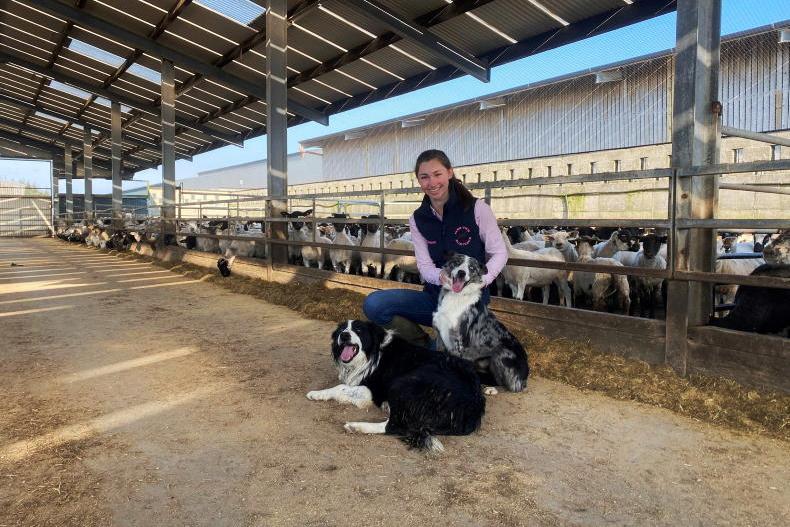

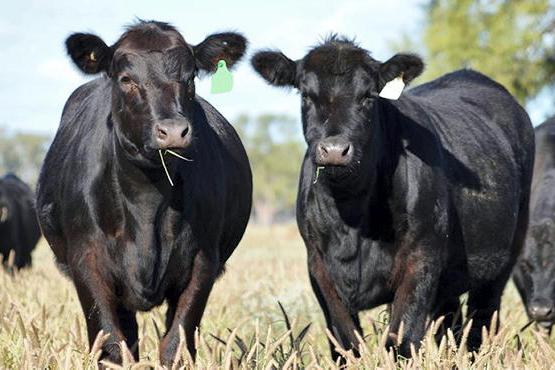

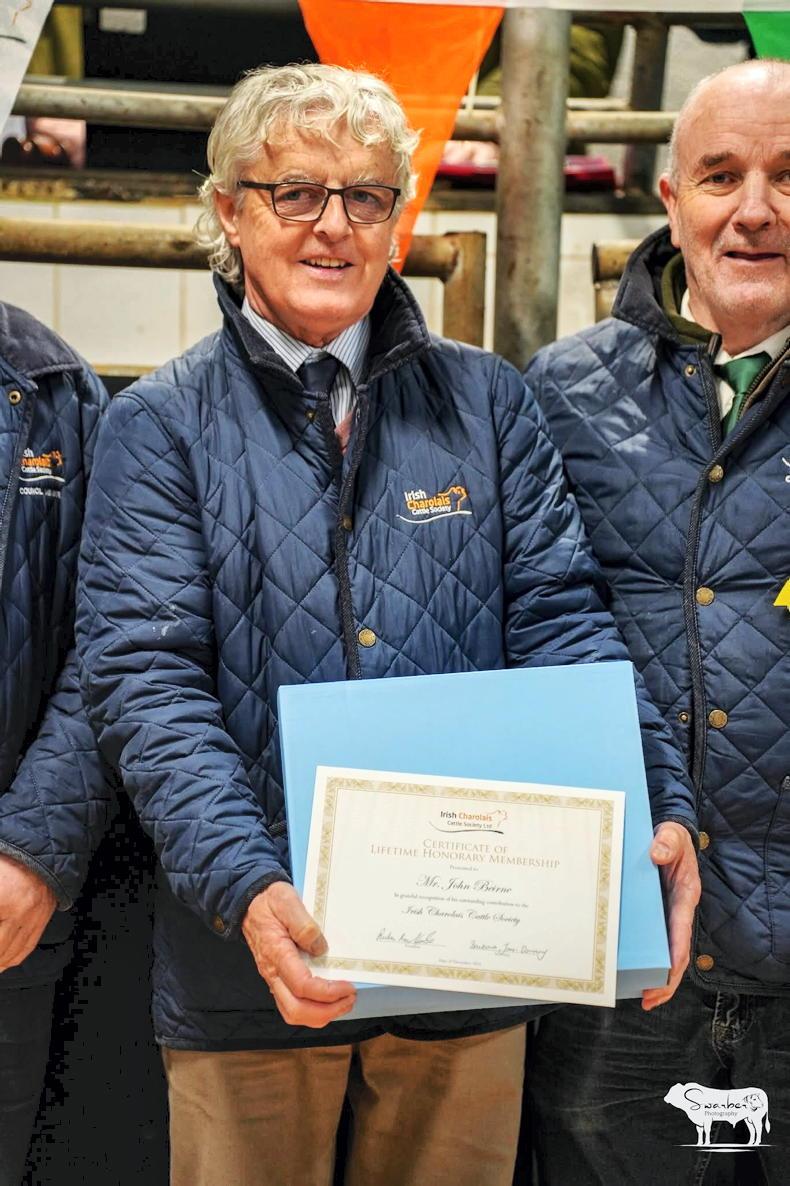
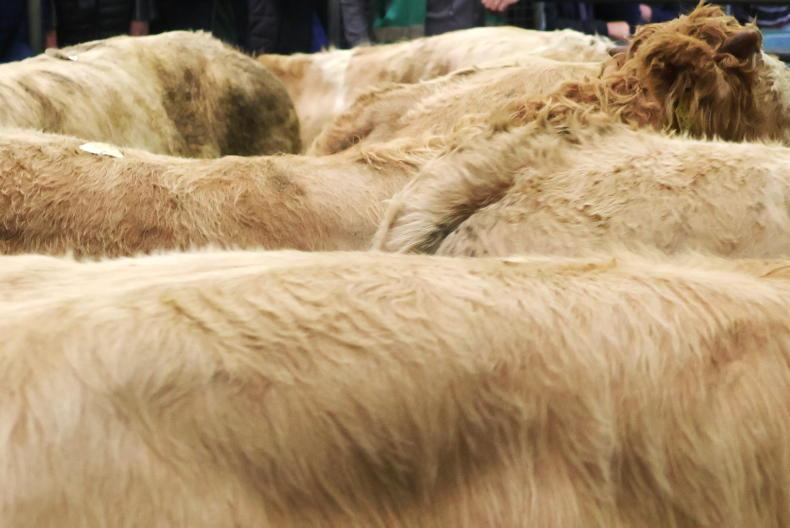

SHARING OPTIONS